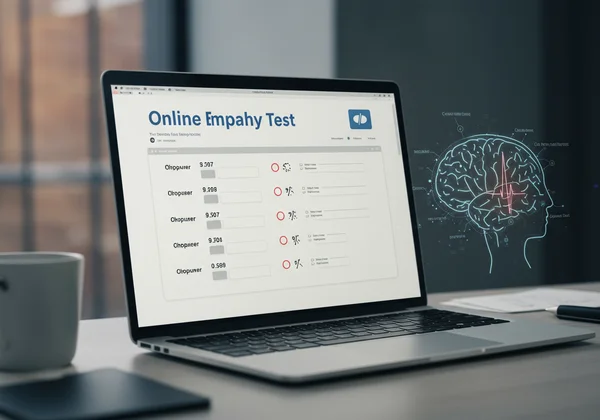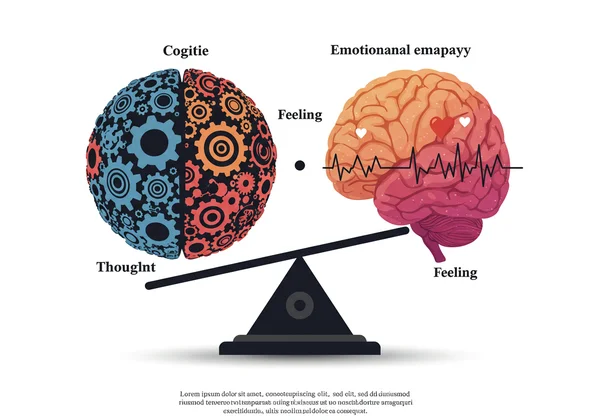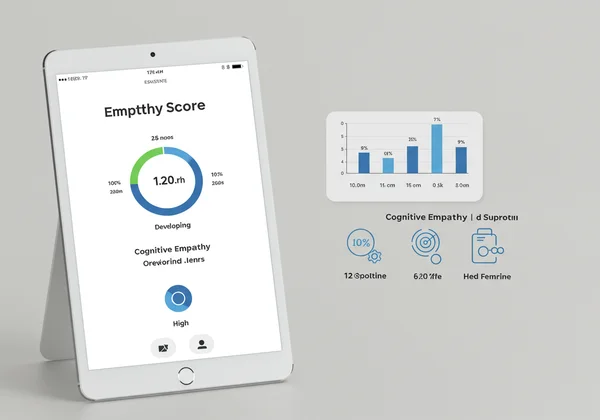Improve Empathy: 15 Habits & Take Your Free Empathy Test
August 10, 2025 | By Penelope Dean
Ready to connect more deeply? Discover how simple daily habits can profoundly transform your empathy, enhancing every relationship in your life. Empathy isn't just a buzzword; it's the fundamental skill that underpins our relationships, fuels our professional success, and enriches our lives. It's the ability to understand and share the feelings of another. Many people believe empathy is a fixed trait you either have or you don't, but modern psychology shows us this isn't true. You can actively improve empathy through consistent, mindful practice. But how do I know if I'm empathetic? The first step on any journey of self-improvement is understanding your starting point. Before diving into these transformative habits, you can discover your empathy score to get a clear baseline.

Understanding Empathy: More Than Just Feeling
To cultivate empathy, we first need to understand what it truly is. It's not about being overly emotional or simply feeling sorry for someone (that's sympathy). Empathy is a complex emotional and cognitive skill that allows us to connect with others on a deeper level. It's a cornerstone of emotional intelligence and a powerful tool for navigating our social world. By breaking it down, we can better target our efforts to build this crucial capacity.
Cognitive Empathy vs. Emotional Empathy: Knowing the Difference
Empathy is generally understood to have two primary components. Cognitive empathy is the ability to intellectually understand someone else's perspective or mental state. It's about putting yourself in their shoes and seeing the world from their viewpoint, without necessarily absorbing their emotions. This is the "thinking" part of empathy.
On the other hand, emotional empathy is the capacity to feel what another person is feeling. When a friend is excited about good news and you feel a surge of joy for them, that's emotional empathy at work. A healthy balance of both types is essential for meaningful connections; one without the other can lead to detached analysis or emotional burnout.

Why Building Empathy Matters for You
Investing time to build your empathy skills pays dividends in every area of your life. In personal relationships, it fosters trust, intimacy, and reduces conflict. At work, high empathy is a hallmark of effective leadership, cohesive teamwork, and successful sales and customer service. It allows managers to better understand their team's needs and professionals to collaborate more effectively. Ultimately, boosting your empathy quotient will bring you a greater sense of connection and personal fulfillment.

Your Action Plan: 15 Daily Habits to Improve Empathy
Ready to start building your empathy muscle? Integrating these small, consistent habits into your daily routine can create profound changes over time. Think of these as your daily empathy exercises.

Active Listening: The Foundation of Connection
When someone is speaking, are you truly listening or just waiting for your turn to talk? Active listening means giving your full attention, withholding judgment, and reflecting on what's being said. Put your phone away, make eye contact, and listen to understand, not just to reply.
Practice Perspective-Taking (Walk a Mile in Their Shoes)
Make a conscious effort to imagine a situation from another person's point of view. Whether it's a frustrated colleague or a family member you disagree with, take a moment to consider their background, pressures, and potential motivations. This is a core exercise in developing cognitive empathy.
Observe Body Language and Non-Verbal Cues
Communication is more than just words. Pay attention to people's tone of voice, posture, gestures, and facial expressions. These non-verbal cues often reveal more about a person's emotional state than their words do, offering rich data for your empathetic understanding.
Read Diverse Fiction and Memoirs
Losing yourself in a book is a powerful empathy-building tool. When you read fiction or memoirs, especially from authors with different backgrounds than your own, you live inside another person's mind. You experience their challenges, triumphs, and emotional world firsthand.
Seek Out New Experiences and Cultures
Step outside your comfort zone. Travel to new places (even within your city), try new foods, or attend cultural events you normally wouldn't. Exposing yourself to different ways of life directly challenges your assumptions and broadens your perspective.
Practice Mindful Observation of Emotions
Start by observing your own emotions without judgment. What does sadness feel like in your body? What thoughts accompany your anger? A deeper understanding of your own emotional landscape—a key part of emotional intelligence—makes it easier to recognize and relate to the emotions of others.
Engage in Compassionate Self-Talk
Empathy begins at home—with yourself. Practice treating yourself with the same kindness and understanding you'd offer a friend. When you learn to forgive your own mistakes and acknowledge your struggles compassionately, you build the capacity to do the same for others.
Volunteer or Engage in Community Service
Volunteering connects you with people whose life experiences may be vastly different from your own. It provides a direct opportunity to practice empathy in a real-world setting, moving beyond theory and into meaningful action. This is a practical form of daily empathy.
Ask Open-Ended Questions
Instead of questions that yield a simple "yes" or "no," ask open-ended questions that invite deeper sharing. Use phrases like "How did that make you feel?" or "What was that experience like for you?" This signals that you genuinely care about their perspective.
Validate Others' Feelings, Even If You Don't Agree
Validation is not about agreement; it's about acknowledgment. You can say, "I can see why you feel so frustrated," or "That sounds like a really difficult situation." This simple act makes the other person feel heard and respected, which is a cornerstone of an empathetic connection.
Journal Your Empathic Encounters
Take five minutes at the end of the day to reflect on your interactions. When did you feel you successfully connected with someone? When did you struggle? Journaling helps you process these experiences and identify patterns in your own empathic responses.
Learn to Manage Your Own Emotions
If you're overwhelmed by your own emotions, it's nearly impossible to have space for someone else's. Developing healthy coping mechanisms for stress and emotional distress prevents empathetic burnout and ensures you can be present for others without losing yourself.
Challenge Your Biases and Assumptions
We all have unconscious biases. Actively questioning your stereotypes and first impressions is crucial. Ask yourself: "Why do I believe this about this person or group?" Consciously challenging these assumptions is a direct way to address what blocks empathy.
Practice Empathetic Communication Online and Offline
Empathy isn't just for face-to-face interactions. Before you post a comment or send an email, take a moment to consider how your words might be received. Tone is easily lost in text, so choose your words with care and aim for clarity and kindness.
Reflect on Your Daily Interactions
Make it a habit to pause and consider your conversations. Did you truly listen? Did you try to understand the other person's perspective? This regular self-reflection solidifies your learning and turns these practices into lasting empathy skills.
Measuring Your Empathy Growth
As you begin incorporating these habits into your life, you'll naturally want to know if they're making a difference. Just like tracking progress in fitness or learning a new language, measuring your empathy growth is a powerful motivator and guide. It helps you see what's working and where you can focus your efforts.
Why Self-Assessment is Key to Empathy Improvement
Self-assessment provides an objective snapshot of your current abilities. It moves your understanding from a vague feeling to a concrete data point. Knowing your baseline empathy score gives you a starting point to measure against as you continue to practice and develop your skills. This process of testing and re-testing allows you to see tangible proof of your hard work.
Take Our Free Empathy Test to Discover Your Score Today
The best way to begin this measurement process is with a structured assessment designed for this purpose. Our free empathy test is based on established psychological principles to give you an accurate reading of your empathy quotient. In just a few minutes, you can gain valuable insights into your emotional and cognitive empathy levels. For those seeking an even deeper understanding, our AI-powered report offers a personalized analysis and an actionable plan for growth. Start your empathy test now to take the first step.

Your Journey to a More Empathetic You Starts Now
Empathy is one of the most rewarding skills you can ever cultivate. It has the power to transform your relationships, advance your career, and connect you more deeply to the world around you. By practicing these 15 daily habits, you are not just learning a new skill; you are actively rewiring your brain for more kindness and understanding.
Your journey of growth starts with a single step: self-awareness. We encourage you to discover your score and use it as a launchpad for a more empathetic life. What habit will you start with today? Share your thoughts in the comments below!
Frequently Asked Questions About Building Empathy
How do I know if I'm empathetic or lack empathy?
Signs of high empathy include being a good listener, easily understanding others' perspectives, and feeling others' emotions. Signs of a lack of empathy might include difficulty understanding why people are upset, appearing insensitive, or struggling in social situations. However, these are just indicators. The most reliable way to know is to take a structured, objective empathy test that can provide a comprehensive score. You can take our online empathy test for a clear and confidential result.
Can empathy truly be learned and developed over time?
Absolutely. Thanks to the principle of neuroplasticity, our brains are capable of changing and forming new neural pathways throughout our lives. When you consistently practice empathetic behaviors like active listening and perspective-taking, you are quite literally building and strengthening the empathy circuits in your brain. It is a skill that anyone can develop with intention and effort.
What are the different types of empathy, and do I need to develop all of them?
The main types are cognitive empathy (understanding) and emotional empathy (feeling). A third type, compassionate empathy, involves being moved to help. While people may be naturally stronger in one area, developing a healthy balance of both cognitive and emotional empathy is ideal for well-rounded relationships and effective communication. Our test can help you identify your unique balance and see which areas may benefit from more focus.
How can our platform help me improve my empathy?
Our platform is more than just a quiz; it's a tool for growth. Our platform provides two key benefits. First, the free standard report gives you a clear, science-based baseline—your Empathy Score—so you know where you stand. Second, our optional AI-enhanced report offers a deep, personalized analysis of your strengths and challenges, complete with a tailored action plan to help you build your skills effectively. Your test result becomes a personalized roadmap, guiding your journey of personal development.